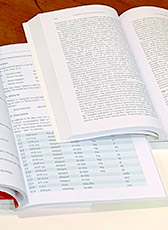The Press welcomes unsolicited manuscript proposals and series proposals. Before submitting any materials, though, we strongly encourage you to read through the description of our mission statement, browse our catalogs, peruse our subject and series listings, look through the lists of recent publications and consult any other material on this site that will give a sense of the scope of our publishing program. If you have any questions about whether your work would be appropriate for the Press, please get in touch with our acquisitions team at hkupress@hku.hk.
Submitting Your Proposal

Before sending a manuscript to the Press, we invite you first to submit a detailed proposal so that we can assess its potential fit with our publishing program. Although there is no single formula for drafting a proposal, it should contain a rationale and synopsis of the work, a table of contents, and information on the intended audience and any related or competitor titles. You are welcome to send a sample chapter or any other information that you think will help us make an appropriate determination about your work.
One of the most satisfying collaborations between scholars and publishers comes from developing book series. Successful series not only publish excellent work but can also shape how and in which direction scholarship evolves and develops. Often mid-career or senior academics have identified areas that are underserved by publishers; they often know of good projects that have a hard time finding the right fit with the ideal publisher. These are signs that a new book series might be welcomed by the Press, by readers, by authors, and by young scholars still considering the direction of their research agendas.
A well thought-out series proposal would have a clear idea of the series’ scope and could articulate clearly what would and would not fit into the parameters of new series. It would be able to describe the current publication trends and demonstrate how a new series would fill a recognized void. And a prospective editor of a new series would almost certainly know of various manuscripts being written whose authors would welcome being published in the new series if it existed.
Please find templates for Book Proposals and Series Proposals below.
Peer Review and Editorial Board Approval

The Press bases its publication decisions on the reports we receive from experts in the field, who are asked to advise on the merits of the work, alongside approval by the Press’ Editorial Board following a positive internal review.
If your acquisitions editor feels your manuscript would be a good fit for the Press, they will ask you to submit a complete manuscript to send out for peer review. You may make suggestions about who you think would be good reviewers; if there are people you think would be inappropriate, you can also let your acquisitions editor know (and why). The time required for the peer review process can vary depending on a number of factors, but an author should expect it to take at least 2 months. Once the reports are received, the acquisitions editor will share them with you and discuss the next steps.
The majority of manuscripts are put under contract after the complete manuscript goes through the peer review process and is subsequently approved for publication by the Editorial Board, but there are some cases when the Press can make an earlier contractual commitment. In these cases, publication is still contingent on the board’s approval, based on reviews of the finished manuscript.
Writing Your Manuscript

After your proposal has been accepted, you will be invited to submit a complete, draft manuscript. Once that draft has been reviewed and approved by the Press, you will be given more time to submit your final manuscript. The final draft needs to be prepared in accordance with the Press’ house style and should incorporate all your final amendments from the peer review process.
The Author Guide (English, 中文) contains important information on how to prepare the manuscript for final submission and provides practical tips to help keep your writing effective and consistent. You are encouraged to consult the Author Guide early on in the writing process.
Style and Formatting
Please ensure that the manuscript follows the HKUP house style as described in the Author Guide. The writing style should be clear and readable while not taking away from the argument of the manuscript. HKUP uses the Chicago Manual of Style (CMOS), 18th edition, on style and format. For manuscripts prepared in British English, we use New Hart’s Rules: The Oxford Style Guide (second edition).
Citation Style
CMOS is our preferred authority on source citation and documentation. The two systems that CMOS recommends are: (a) notes and bibliography, and (b) author-date references. If you prefer to use a different citation style, please notify your acquisitions editor before you submit your final manuscript. We encourage you to consult your acquisitions editor if you have questions about citing Chinese sources in a manuscript written in English. You could also take a look at the Quick Guide on Citation Style for Chinese, Japanese, and Korean Sources provided by the Yale University Library.
Obtaining Permission
As an author, you are responsible for securing permission to use any material in your manuscript that you do not own. These include extracts from other books, journals, websites, photographs, images, graphics, charts, and other illustrations that were not created by you. As clearing permissions can take time, with some copyright holders being difficult to locate or slow to respond, we strongly advise that you send in requests as early as possible in the writing process as failure to obtain permission may affect the contents of your final draft and delay the schedule. Please send in your permissions documentation to your editor when submitting your final draft.
Under Hong Kong law, there are exemptions for using copyright material without permission under a defence called ‘fair dealing’. The legislation sets out a limited number of circumstances in which fair dealing can be asserted, including using the material for ‘criticism or review’. In all cases, it must be accompanied by sufficient acknowledgment and its usage must be ‘fair’.
For further information on copyright and permissions, please see our Copyright and Permissions Guide or contact your acquisitions editor. Although we cannot offer legal advice, we would be happy to share with you our understanding of the law in the context of the material you intend to use.
Communication
We encourage you to stay in regular touch with your acquisitions editor about your progress while you are writing your manuscript. You are welcome to send draft chapters or other sample material to the Press throughout the process of drafting the manuscript for feedback, or if you have questions about the publication process at any point, feel free to ask. We advise authors to ask questions sooner rather than later.
Delivery
You may work closely with your acquisitions editor to agree on deadlines for submitting the draft manuscript for peer review, as well as deadlines for the submission of the final draft depending on the extent of revisions needed. Please do your best to keep your acquisitions editor informed about any changes to your deadlines, as this will help the Press better coordinate the production and publication schedule of your book.
Once you have finished the final manuscript, please send it to your acquisitions editor together with the completed HKUP Manuscript Submission Checklist. Make sure that you have submitted all files, including the illustrations and tables, captions, and permissions. At this point, you can also pass on ideas about possible cover designs to the acquisitions editor.
Production

Once you submit your final, complete manuscript, the project will be passed on to the Press’s managing editor, who oversees the copyediting and production process.
The copyediting, typesetting, and printing schedule will be available to the author on-line through the Press’s author portal. You are encouraged to consult this resource frequently to keep informed about their manuscript’s progress.
The main purpose of copyediting is to help the work conform to the norms of book publishing and the expectations of the book’s projected audience. Insofar as possible, the copyeditor will try to help you achieve consistency and clarity throughout, but you will always bear full responsibility for every aspect of the final publication. Note that making changes to the text after this point is both expensive and likely to introduce errors. Therefore, after carefully reviewing the copyedited manuscript, the version you return will be considered final. After your review of the copyedited files, you will receive the page proof of the work. It is important for you to review the page proof carefully, alerting the Press to any problems. The Press will do all it can to ensure an error-free final product, but the task of proofreading is your responsibility. If the finished book is to have an index, you can use the page proof to create it (or hire a professional indexer to do the job) according to the Press’s guidelines and submit it when returning the page proof.
After Publication

During the production process, the marketing department will contact you to discuss the marketing plan for your book. You will be asked to complete a marketing form to guide us on such issues as where to send review copies, whether the book would be a good candidate for any book prizes, and so on. Perhaps the most important component of the marketing program is the descriptive copy used for the book. Your acquisitions editor will work with you—incorporating input from the marketing and copyediting departments—to come up with the most compelling way of presenting your work.
The copyediting, typesetting, and printing schedule will be available to the author on-line through the Press’s author portal. You are encouraged to consult this resource frequently to keep informed about their manuscript’s progress.
The Press has an extensive international distribution network to ensure your book reaches the widest possible audience. Our books are available around the world in bookstores, libraries, academic institutions, and in digital format on major library platforms, e-book aggregators and online retailers. The Press sees its position in Greater China as a distinct advantage and works hard to get all of the Press’s publications into the hands of mainland readers. The most effective way of doing this is to sell translation rights to mainland publishers, which is the primary goal of our rights department. If you know of any publishers who might be interested in issuing translations of your work (whether for the China market or in any other language) please pass this information to your acquisitions editor.
Despite all the Press’s marketing activity, no one can ever promote a book better than its author. Social media, blogs, op ed pieces, and even scholarly articles are all excellent ways of letting potential readers know about your book. If you are able to arrange any kind of book talk or other event, our marketing team can support you either by working with a local bookstore to sell books on site or by providing flyers allowing participants to purchase copies.
